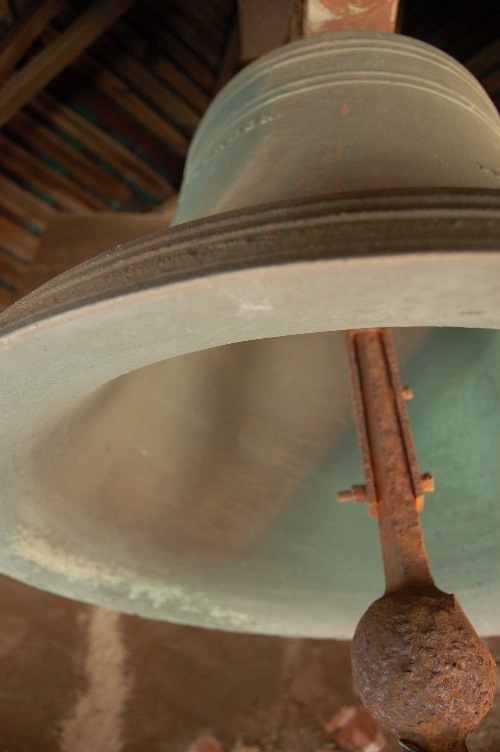This is the bell of the Scots Presbyterian church in Fremantle. It was made in London, and has been ringing over the roof tops of Fremantle for the last 110 years.
This morning I climbed up through a series of very dusty chambers and ancient wooden ladders to the top of the church spire where this sight confronted me. It is not generally open to the public, and my thanks go to Sandy, the obliging old fellow who took me up there (none of the other churches in town would let me go up their spires).
I hear bells like this one toll every day and every night while I lay in my bed before driting off to sleep. Their sound means something to me.
First, it is part of the identity of this place I live in. Hi fi, that is, coherent and unique sounds, and not low fi, meaning the background hum of traffic and the like, is partly constitutive of a place’s identity. Then, the sound is like the birds which regularly cry ‘Attention!’ in Aldous Huxley’s novel Island: it is a call for us to bring attention to the moment. Finally, the sound is a calming reminder of a more monastic pace of life.
But you may be wondering why I’m writing about a church bell in this blog. At the start of December, thanks to the organising efforts of the Climate Institute, 16 of Australia’s religious communities signed a document called ‘Common Belief’.
In this document some very important things are contained, some of which I want to highlight.
In this document, a bishop of the Anglican church called the destruction of the environment a ‘sin’. He called climate change a ‘core matter of faith’.
The Australian Christian Lobby said that we have a moral duty to be stewards of creation.
The Buddhists said that ‘when one treats nature as a friend and teacher, one can be in harmony with other creatures, and appreciate the interconnectedness of all that lives.’
Australia’s Catholic bishops said that we are indebted to environmental activists, as ‘such people show that humanity elevates itself when it reaches for a heightened consciousness of Life on Earth.’
The Islamic faith was in accord with all of the churches when it said that ‘people of religion must forget their theological differences and work together to save the world from climate ruin.’
The Salvation Army decried the the ‘environmental vandalism’ that is rapid climate change, and said that we must each take ‘practical steps to regenerate and conserve’ the Creation.
The Uniting Church admitted it had been complicit in the abuse of the creation in the past, and renewed its commitment to treat ‘the earth itself and all the life that it supports’ as precious.
I’m not religious, but I now see that I share some common beliefs with my church-going neighbours.
Environmentalism used to be seen as concern of a ‘special interest group’. No longer. Now it has been publicly acknowledged for what it truly is: an essential part of a thoughtful and ethical human life.
The bell tolls for you.
See more photos on wikimedia commons.
